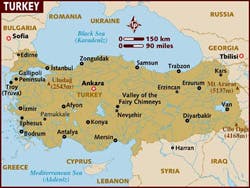At first glance, Turkey may seem like an unlikely outlet for US aftermarket parts and services, but it deserves a more thorough assessment.
Like this article? Sign up for our enews blasts by clicking here.
Another major blot on its international reputation is its poor history of human rights violations. This has proved to be a major stumbling block in Turkey’s efforts since 2005 to join the European Union (EU). Non-membership has not, however, markedly affected Turkey’s economy. Although it experienced some downturns during the global recession, it did not suffer as greatly as some of the other European countries, such as Greece and Spain.
Over the long term, this EU refusal of Turkey’s entry may prove to be a costly mistake for Europe as the country turns east to increase trade with its Muslim neighbors. However, this trade has been affected by the ongoing conflict in Syria, one of Turkey’s main land export routes to the Middle East. This has been offset to some extent by the opening of Iraq’s borders, which has provided Turkey with an opportunity to export its goods via this route.
Turkey is defined by the International Monetary Fund (IMF) — a 188-country organization working to foster global monetary cooperation — as a European Commission market economy, having progressed over the last 10 years from a country that borrowed from the IMF to one that now lends to the same organization. In 2011, Turkey had the fastest growing economy in Europe with an expansion of 8.5 percent. This economic growth has led to Turkey becoming the world’s 16th largest economy and one of the leading producers of, among other things, motor vehicles. In 2012, Turkey’s main trading partners were Germany, Russia and Iran, although it also ranked as the US’s 21st largest goods export market.
Turkey’s first car assembly plant was established in Istanbul in 1959 to manufacture cars under license from Ford. In the same decade, licensed production of Renault and Fiat models also began. Since the beginning of the 1990s, incentives have been given to investors in order to increase the production of motor vehicles. Three of the top four vehicle producers, Ford Otosan, Oyak Renault and Tofas Fiat, are partnerships between foreign and Turkish carmakers with the fourth, Toyota, being now wholly Japanese owned. From its beginnings in the 1960s, vehicle production output has risen until it now ranks as the sixth largest automotive producer in Europe. Four of the country’s top 10 overall exporters are automotive firms, which gives some idea of the importance of the automotive industry to the economy. In all, there are currently 15 commercial vehicle and passenger car manufacturers in Turkey, and seven tractor manufacturers. The foreign car makers in Turkey are Fiat, Mercedes, Renault, MAN, Peugeot, Land Rover, Ford, Isuzu, Hyundai, Toyota, Honda, Mitsubishi and Tata. Many of these producers are located in the industrial Marmara region, the smallest but most densely populated (with approximately 30 percent of the overall population) of the seven geographical regions of Turkey. The vast majority of vehicle production is for the export market, but Turkey also has a growing domestic market, which has great potential with some 70 percent of households still not owning a car.
To put this in perspective, in 2009 there were 104 cars per 1,000 people in Turkey, compared with 500 per 1,000 in countries such as Germany and France. Despite this low level of car ownership, an expected increase in per capita income will boost consumer spending power in the next few years, leading to a growth in the market for motor vehicles and associated parts and services. This growth in vehicle ownership could, however, be restricted by the country’s punitive Special Consumption Tax (SCT) on vehicle purchases, which can raise the domestic purchase price of a vehicle by between 60 percent and 100 percent above the pre-tax price.
Running parallel with the production of motor vehicles is a strong automotive parts sector. This sector is made up of major multinational producers and local companies producing a wide range of parts mainly for export including batteries, tires, spark plugs, carburetors, castings, injection-molded parts, fuel injection systems and transmission parts, among others. Export of these parts represents some 30 percent of the total automotive exports from Turkey.
The combination of a large and diverse vehicle manufacturing industry and likely increase in private vehicle ownership means that Turkey has great potential as an outlet for US aftermarket parts and services. While new car sales are set to increase in the coming years in line with increases in disposable income, there is also likely to be an increase in car ownership among the lower-paid sector of the population. This section of the populous will most likely only be able to afford the purchase of used cars. This, in turn, could lead to a large market for service and customization parts. Because of its unique geographical position, Turkey could also be used as a staging point (subject to any trade restrictions) for trading with neighboring countries such as Iraq, Iran, Syria and beyond — countries who might otherwise be hostile to trading directly with US companies.
Anyone considering doing business in the Republic of Turkey should realize before starting out that it is a complex and challenging market that requires persistence, adaptability, careful planning and patience. It has been said that it should be treated like a semi-developed country with problems likely, including contradictory trading policies and regulations, time consuming and unpredictable legal and regulatory framework and lack of transparency in tenders. For these and other reasons, a proven and successful quick-entry strategy into the Turkish market is via an experienced local partner.
Subscribe to Aftermarket Business World and receive articles like this every month….absolutely free. Click here.


